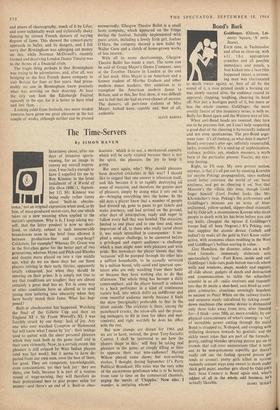The Time-Servers
By SIMON RAVEN
SEARCHING about, after ten days of intensive sports- viewing, for an image to convey my overall impres- sion, I was lucky enough to have it supplied for me by Roy Kinnear in the latest instalment of A World of His Own (BBC-1, Septem- IIIIber 11). Mr. Kinnear was being really rather funny about 'built-in obsoles- cence,' not an original expression when used, as. by him, of mass-produced motor-cars, but one which takes on a new meaning when applied to the nation's sportsmen. Why is it, I keep asking my- self, that the latter product is now so short- lived, so rickety, subject to such innumerable breakdowns even in the brief time allowed it between production-line and scrap-heap? Cricketers, for example? Whereas Dr. Grace was in the first-class game for the better part of two generations, whereas Mynn and Pilch and Rhodes and dozens more played on into a ripe middle age, what do we see these days but our finest players retiring in their early thirties, apparently totally exhausted, just when they should be entering on their prime. It is simply not true to say that conditions are tougher; they are almost certainly a great deal less so. Yet in some way or other conditions have so altered as to send young men tottering into obscurity when they have barely tasted their fame. What has hap- pened?
Built-in obsolescence has happened. Watching the final of the Gillette Cup and then an England XI v. Sir Frank Worrell's XI, I was forcibly struck by one thing: lack of joy. Any one who ever watched Compton or Hammond bat will know what I mean by 'joy': their innings used to quiver with the sheer personal pleasure which they took both in the game itself and in their own virtuosity. Now, to a certain extent this pleasure is still evinced by West Indian players (and was last week); but it seems to have de- parted from our own men, even the best of them, for good. They are competent, knowledgeable, even conscientious, yet they lack joy: they are there, one feels, because it is part of a routine round of wage-earning, they will therefore do their professional best to give proper value for money—and there's an end of it. Built-in obso-
lescence: which is to say, a mechanical capacity which will be early vitiated because there is not the spirit, the pleasure, the joy to keep it going.
But once again, why? Why should pleasure have deserted cricketers in this way? I should like to suggest that one answer is television itself, and this because it is so rapidly destroying all sense of occasion, and therefore the greater part of pleasure, simply by doing what it sets out to do—bringing everything into the home. In the old days a player knew that a number of people had dressed up, gone to pains to get tickets and make journeys, and had arrived on the ground, after days of anticipation, ready and eager to follow every ball that was bowled. The occasion, limited to one place and to one time and, most important of all, to those who really cared about it, was much intensified in consequence: it im- plied a unique challenge, to be answered before a privileged and expert audience—a challenge which a man might meet with pleasure and with pride. But nowadays the player knows that this `occasion' will be pumped through the ether into a million households, to be casually surveyed by a million bored, telly-sated and ignorant spec- tators who are only watching from sheer habit or because they have nothing else to do that afternoon. The whole thing has become a daily commonplace; and the player himself is reduced to a hack performer in a kind of continuous variety hall, into which drifts an indifferent and even resentful audience merely because it finds the show (marginally) preferable to that in the street outside. The cricketer is there, among the pasteboard crooks, the know-alls and the pranc- ing teenagers, to fill in time for idlers and mal- contents`, and right worthily he does his office with the rest.
But now stumps are drawn for 1964 and we are to have, instead, the great Tory-Socialist Contest. I shall be interested to see how the players shape in this: will they be taking real pleasure in the game, or simply filling in time to appease their vast non-audience? Harold Wilson played some showy but non-scoring strokes, I thought, during September I 1 's Party Political Broadcast. His voice was the very echo of the anonymous gentleman who is to be heard, from time to time on the commercial channels, urging the merits of `Chipples.' Now who, I wonder, is imitating whom?


































 Previous page
Previous page